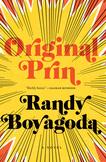Review: Canada’s undivine comedy
How do you write a comedy about listening to God? In Randy Boyagoda’s Original Prin, the answer lies in God’s silence and the attempts, by a man, to fill it.
The titular Prin lives a tested but mostly pedestrian life. He “is a forty-year old associate professor of English with early-stage cancer” who works at a financially endangered Catholic university in Toronto. And the unexpected return of his ex-girlfriend, along with the promise of travel to a Middle Eastern country called Dragomans, threatens his relationship with his “Catholic everything” wife.
He inhabits, in short, a modest existence touched by massive forces but one that has unfolded (at least at first) undramatically. Much of the novel’s humor arises in Prin’s response to this state, a constant and almost bottomless capacity for self-inflation that can find prophetic significance anywhere. Naturally, as we learn, Prin makes an obsessive, almost dangerous reader. Boyagoda, an English professor himself, deliciously eviscerates Prin’s academic “presentations on the penis shaped like a sleeping seahorse...in Michael Ondaatje’s The English Patient.”
That Randy Boyagoda can take on faith, global capitalism, religious terrorism, upper-middle-class preciousness and self-delusion—all the while implicating Canada in traditionally “American” problems—attests to his talent.
But for all its campus-novel punches, Original Prin most succeeds in limning the ways Prin’s faith bends to his needs. While ignoring the advice of priests and his wife, he reads “signs” everywhere he wants them to appear. “God use[s] a winter weather event to tell him this was the perfect day” to tell his daughters about his diagnosis. Letting his wife sleep “across his small, bony midriff” is “an opportunity for solidarity with Christ.” As the novel continues through Prin’s slow (but for now incomplete) radicalization, it becomes clear that he came to it already a bit fanatical.
That Boyagoda can take on faith, global capitalism, religious terrorism, upper-middle-class preciousness and self-delusion—all the while implicating Canada in traditionally “American” problems—attests to his talent. It also manages to be a taut and funny novel throughout, if maybe too arch.
Jokes fly almost unsustainably, exhausting not just the reader but often their own vitality. If we get the sense that Boyagoda respects our time—and wants it to be a good one—we cannot help but feel, when he overplays his hand, that he may not trust our patience.
Prin’s journey, Boyagoda makes clear, does not end with this book. This is the first volume of a planned trilogy. If I could hazard my own divination of signs, I would bet Boyagoda could take him anywhere. Sadly (or funnily) enough, it looks like Prin’s faith could, too.
This article also appeared in print, under the headline “Canada's undivine comedy,” in the May 27, 2019, issue.









